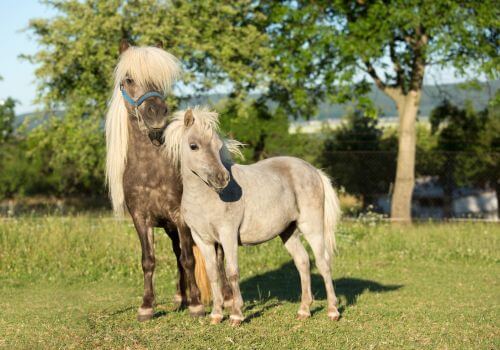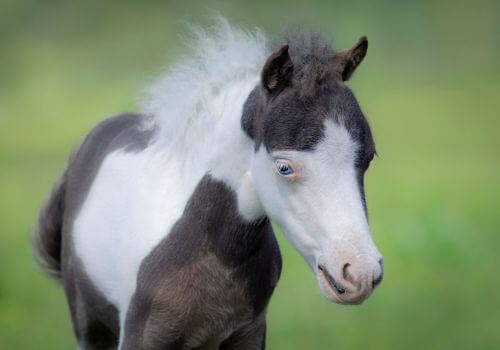Mini but Mighty: The Miniature Horse!
- Weight: 150 to 350 pounds
- Height: Typically under 8.5 hands (34 inches) to 9.5 hands (38 inches)
- Body Type: Small, muscular build; many have similar proportions to larger horses
- Best For: Companion animals, therapy work, and driving
- Life Expectancy: 35 years

A Tiny Horse with a Big History
Miniature horses have a charming history, having been selectively bred for centuries, with their roots going back to 17th-century Europe. Initially loved by nobility for their uniqueness, these small yet mighty horses also proved to be quite handy in mining thanks to their petite stature. They made their way to the United States in the late 1800s and quickly became beloved as both hard-working partners and companions.
Today, two main registries oversee the breed: the American Miniature Horse Association (AMHA) and the American Miniature Horse Registry (AMHR), which recognize different height classifications.
How Small is a Miniature Horse?
Miniature horses are measured in inches rather than hands. The AMHA registers horses that stand at 8.5 hands (34 inches) or shorter, while the AMHR allows for two divisions: 8.5 hands (34 inches) and under, and 8.5 to 9.5 hands (34-38 inches). They generally weigh between 150 and 350 pounds.
Small Horses Loaded with Love
Initially bred for their small stature, Miniature Horses have since been used for a variety of purposes. While they are too small to be ridden by most people, they are often trained for driving, agility competitions, and therapy work. Their gentle, friendly nature makes them excellent emotional support animals and service animals for individuals with disabilities.
The Rainbow of Miniature Horse Colors and Markings
Miniature horses come in nearly every equine coat color and pattern, including solid, pinto, and Appaloosa-like spotting. Their thick coats, full manes, and tails contribute to their charming appearance.

What Makes a Miniature Horse Special?
Miniature horses are often mistaken for ponies, but they have distinct proportions similar to full-sized horses rather than the stocky build of ponies. They are highly intelligent, social, and affectionate, making them ideal companions. Their small size also allows them to thrive in smaller pastures compared to larger horse breeds.
Proper Diet and Nutrition for Your Miniature Horse
Miniature horses require a well-balanced diet of high-quality grass, hay, and grains, with treats such as fruits and vegetables given in moderation. Due to their small size, they are more prone to obesity, making portion control essential to keep them healthy and in good condition.
Common Health Issues of Miniature Horses
Miniature horses are as special as they are cute. They need to have regular wellness exams with their veterinarians to prevent possible weight, dental, and digestive issues. Other common health issues that can affect Miniature Horses include:
- Dwarfism Mutations: Miniature horses are sometimes bred too small, resulting in genetic deformities and health complications.
- Obesity: Minis are often overfed, leading to weight-related health issues.
- Dental Issues: Due to their small skull size, they are prone to overcrowding and misaligned teeth.
- Hyperlipemia: A condition affecting ponies and minis that results in high triglyceride levels, requiring veterinary care.
- Colic: A common digestive issue that can be fatal if not promptly treated.
Grooming Tips for These Little Beauties
Miniature horses require the same grooming care as full-sized horses. Daily brushing, hoof cleaning, and regular veterinary checkups are essential for their overall health and well-being. A farrier experienced with minis is recommended for maintaining proper hoof health.
Saddling Up Our Final Thoughts
Miniature horses are charming, intelligent, and affectionate companions. Whether serving as therapy animals, working in driving sports, or simply being beloved pets, these small but mighty horses continue to capture hearts worldwide.
